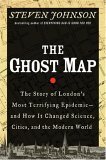The Ghost Map: The Story of London’s Most Terrifying Epidemic–And How It Changed Science, Cities, and the Modern World
 On the advice of NPR’s Books podcast I decided to read Stephen Berlin Johnson’s The Ghost Map. A work of non-fiction, the book begins with London’s deadliest cholera epidemic in the year 1954. Set before the full advent of microscopic examination and germ theory proper, the it trails the work of the real life heroes that set about unraveling the mystery of cholera and the epidemic in the face of centuries of fallacy and superstition. The celebrated Dr. John Snow of London’s medical society risks reputation and ridicule by flying in the face of the prevailing theories of the time to uncover the nature of the disease and ultimately save thousands if not tens of thousands of lives from the outbreak. On a parallel track, Rev. Henry Whitehead braves the most festering and dangerous neighborhoods of Victorian London to bring comfort to the stricken and emerge with vital information about the epidemic. Both men’s paths intersect and ultimate combine to result in one the first, definitive firebreaks of urban plague in the modern Western world.
On the advice of NPR’s Books podcast I decided to read Stephen Berlin Johnson’s The Ghost Map. A work of non-fiction, the book begins with London’s deadliest cholera epidemic in the year 1954. Set before the full advent of microscopic examination and germ theory proper, the it trails the work of the real life heroes that set about unraveling the mystery of cholera and the epidemic in the face of centuries of fallacy and superstition. The celebrated Dr. John Snow of London’s medical society risks reputation and ridicule by flying in the face of the prevailing theories of the time to uncover the nature of the disease and ultimately save thousands if not tens of thousands of lives from the outbreak. On a parallel track, Rev. Henry Whitehead braves the most festering and dangerous neighborhoods of Victorian London to bring comfort to the stricken and emerge with vital information about the epidemic. Both men’s paths intersect and ultimate combine to result in one the first, definitive firebreaks of urban plague in the modern Western world.
While I learned far more about cholera and Victorian London’s lower class/caste than I’ll probably ever need to know, it quickly became apparent that Johnson’s intended scope in The Ghost Map is far larger than a single epidemic in 1854 or even the era in general. As the drama of the year 1854 comes to a close in the book, Johnson leverages the story into an examination of modern disease theory, society, city planning, globalization and warfare. While it is wonderful to see the thousand threads radiating out from this one event in history, it may sound like Johnson might be over reaching in scope and regrettably, I feel his does. In its last chapters, The Ghost Map map begins to diffuse from earlier intensity and the author seems determined to hit on just about every topic facing our modern world. While the connections are fascinating, it ultimately left me with a vague sense of mental dispersal rather than a lasting impression of the information that came before. Fortunately, Johnson provides a rich set of references and further reading for those that want to track down the myriad of embers left smoldering at the end of the book.







I wanted to read that. I’m pleased to know someone else who would read a whole book about cholera. 🙂
Would you like to borrow my copy?
Yes, I would. Thank you.
My pleasure, this coming week promises to be rough on free time but I’ll touch base later in the week and we can work out a time.